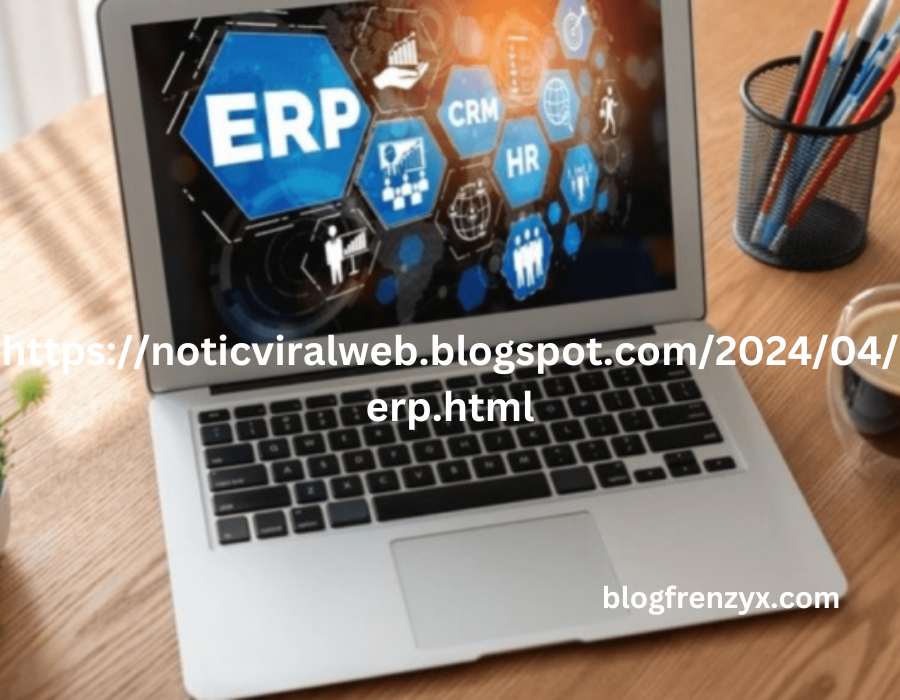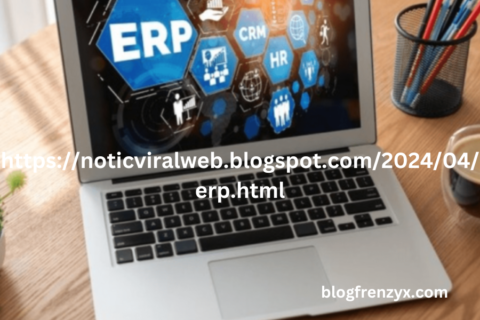Introduction to ERP
Enterprise Resource Planning (https://noticviralweb.blogspot.com/2024/04/erp.html) is a comprehensive business management software that integrates various functions within an organization. It centralizes processes like finance, human resources, procurement, and inventory management, streamlining operations across departments. ERP systems have become crucial in modern business, helping organizations achieve greater efficiency, data accuracy, and improved decision-making.
ERP systems allow businesses to manage and monitor their activities in real-time, offering a unified view of core processes. By integrating information from different areas, ERP enables better coordination, reducing redundancies and errors. The purpose of this blog is to provide a detailed understanding of ERP systems, their evolution, benefits, challenges, and future trends, helping readers appreciate their significance in the modern business landscape.
History and Evolution of ERP
ERP systems have their roots in the 1960s, with the development of Material Requirements Planning (MRP) systems for manufacturing. These systems helped businesses manage production schedules, inventory, and purchasing. Over time, MRP evolved into Manufacturing Resource Planning (MRP II), which incorporated additional functions like financial management and human resources.
In the 1990s, https://noticviralweb.blogspot.com/2024/04/erp.html emerged as a more comprehensive solution, integrating multiple business processes into a single platform. Companies like SAP and Oracle became pioneers in the ERP industry, offering customizable solutions for different industries.
Key milestones in ERP evolution include:
- Introduction of modular systems: Companies could select specific modules for their business needs, reducing unnecessary complexity.
- Cloud-based ERP: The shift from on-premises systems to cloud ERP solutions in the 2000s made implementation more cost-effective and accessible.
- Mobile and AI integration: Recent advancements incorporate AI and mobile access, making ERP systems more intelligent and flexible.
The evolution of ERP continues, with cloud-based platforms becoming the standard for modern businesses. This transition has enabled faster deployment, improved scalability, and enhanced collaboration across departments.
Key Features of ERP Systems
ERP systems offer several essential features that help businesses manage and streamline their operations. These features include:
- Finance and Accounting: Manage financial transactions, budgeting, and reporting in one centralized system.
- Human Resources (HR): Track employee data, payroll, benefits, and performance.
- Supply Chain Management: Oversee the entire supply chain, from procurement to product delivery.
- Inventory Management: Monitor stock levels, manage orders, and reduce excess inventory.
- Customer Relationship Management (CRM): Improve customer service and track interactions.
Real-time data and analytics form the backbone of modern ERP systems, allowing businesses to make informed decisions quickly. By providing instant access to critical information, https://noticviralweb.blogspot.com/2024/04/erp.html enhances transparency and efficiency.
Customization is another significant feature. Many ERP systems offer flexible modules that can be tailored to the specific needs of a business. This ensures that companies can integrate the most relevant functions into their ERP system without unnecessary complexity.
Benefits of Implementing ERP
Implementing an ERP system can transform a business, offering several key benefits:
- Increased efficiency and productivity: By automating routine tasks, ERP frees up employees to focus on more strategic activities.
- Enhanced data accuracy: ERP systems reduce manual data entry, minimizing errors and ensuring more reliable information.
- Improved decision-making: Access to real-time data helps managers make informed decisions based on current business conditions.
- Cost savings: ERP systems optimize resource allocation, reducing waste and lowering operational costs.
- Better collaboration: By centralizing data, ERP improves communication and collaboration between departments.
An ERP system brings all critical business information under one roof, providing a unified view of operations. This visibility enables businesses to identify inefficiencies, track performance, and respond more effectively to market changes.
Challenges in ERP Implementation
Despite the numerous benefits, https://noticviralweb.blogspot.com/2024/04/erp.html implementation can pose significant challenges for businesses. Some common obstacles include:
- High initial costs: ERP systems, especially on-premises solutions, require a significant financial investment in software, hardware, and training.
- Resistance to change: Employees may resist adopting new systems due to unfamiliarity or fear of job displacement.
- Complex implementation: ERP projects often involve complex integrations, requiring careful planning and expertise.
- Data migration issues: Transferring data from legacy systems to an ERP platform can be time-consuming and risky.
To overcome these challenges, businesses need to focus on careful planning and preparation. Key strategies include:
- Engaging stakeholders: Involve employees from different departments early in the process to ensure smooth transitions.
- Training and support: Provide comprehensive training to users to ease the learning curve.
- Phased implementation: Implement ERP systems gradually, focusing on critical functions first to minimize disruptions.
While ERP implementation requires time and resources, proper planning can help businesses overcome these challenges and enjoy long-term benefits.
Types of ERP Solutions
Businesses can choose from several types of ERP solutions based on their size, industry, and specific needs. These include:
- Cloud-based ERP: Hosted on remote servers, cloud ERP offers flexibility, scalability, and lower upfront costs. It is ideal for small- to medium-sized businesses looking for affordable solutions.
- On-premises ERP: Installed on a company’s own servers, on-premises ERP provides more control but involves higher costs for hardware and maintenance.
- Hybrid ERP: Combines both cloud and on-premises features, offering businesses the flexibility to store sensitive data locally while using cloud services for other functions.
Popular ERP software options include:
- SAP: Known for its robust features and scalability, SAP serves large enterprises with complex needs.
- Oracle ERP: Offers powerful cloud solutions with a focus on automation and AI integration.
- Microsoft Dynamics 365: A flexible ERP system suitable for small to medium-sized businesses, with strong integration with other Microsoft products.
When choosing the right ERP solution, businesses must consider their budget, growth plans, and specific functional requirements. Evaluating different options based on scalability, user experience, and industry-specific needs will help make the best decision.
Industry-Specific ERP Solutions
ERP systems can be tailored to meet the specific needs of various industries. Different sectors, such as manufacturing, healthcare, and retail, require unique functionalities to handle their operations effectively.
- Manufacturing: ERP systems in manufacturing offer tools for production planning, inventory management, and quality control. They help manufacturers streamline processes and reduce waste.
- Retail: In the retail sector, ERP systems assist with inventory tracking, sales forecasting, and supply chain management. Retailers benefit from real-time data, helping them respond to customer demand more effectively.
- Healthcare: Healthcare ERP solutions manage patient records, inventory of medical supplies, and compliance with regulations. These systems improve operational efficiency and ensure better patient care.
Industry-specific ERP systems offer customized features that address the unique challenges faced by businesses in these sectors. This tailored approach ensures that the ERP system aligns with industry standards and best practices.
Future Trends in ERP
The future of ERP is being shaped by emerging technologies that promise to make systems more intelligent, efficient, and user-friendly. Key trends influencing the future of ERP include:
- Artificial Intelligence (AI): AI integration in ERP systems allows for predictive analytics, automation of routine tasks, and improved decision-making.
- Machine Learning (ML): ML helps ERP systems learn from data patterns, offering insights into operational trends and customer behavior.
- Internet of Things (IoT): IoT enables ERP systems to track physical assets, monitor production lines, and manage inventory more effectively.
- Mobile Access: Mobile-friendly ERP systems allow employees to access critical information and perform tasks from anywhere, improving flexibility and collaboration.
As businesses continue to adopt these technologies, ERP systems will become more adaptive and intelligent. The future will likely see a greater emphasis on cloud-based solutions, automation, and data-driven decision-making. Companies that embrace these changes will be better equipped to respond to market demands and improve their operational efficiency.
Conclusion
https://noticviralweb.blogspot.com/2024/04/erp.html play a vital role in helping businesses streamline operations, improve data accuracy, and make informed decisions. With their ability to integrate multiple functions across departments, ERP systems offer significant benefits, from increased efficiency to better collaboration.
This blog has explored the history, features, benefits, and challenges of ERP systems, along with future trends that will shape the ERP landscape. Implementing an ERP system requires careful planning, but the long-term benefits far outweigh the initial challenges.
FAQs
What is an ERP system used for?
ERP systems integrate business processes, such as finance, HR, and supply chain management, into a single platform for better management.
What are the benefits of using an ERP system?
ERP improves efficiency, data accuracy, and decision-making while reducing operational costs and enhancing collaboration between departments.
What are the challenges of implementing an ERP system?
Challenges include high costs, resistance to change, data migration issues, and the complexity of integrating multiple business processes.
What are the types of ERP solutions available?
ERP solutions include cloud-based, on-premises, and hybrid systems, with popular options like SAP, Oracle, and Microsoft Dynamics 365.
What industries benefit from ERP systems?
Industries such as manufacturing, retail, and healthcare use ERP systems to manage production, inventory, sales, and regulatory compliance efficiently.






